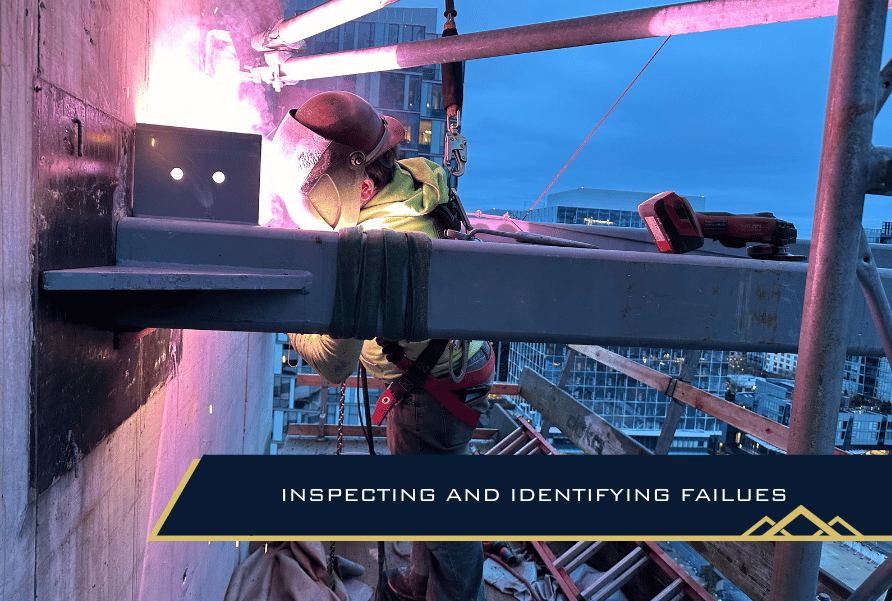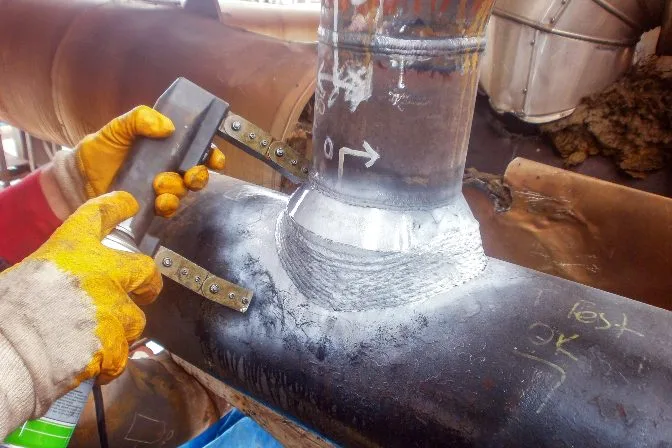Why Choose Expert Welding Inspection Madison for Your Jobs
Why Choose Expert Welding Inspection Madison for Your Jobs
Blog Article
The Relevance of Thorough Welding Assessment in Industrial Applications
In the realm of industrial applications, the significance of careful welding inspection can not be overemphasized. It plays an important function in making certain the architectural honesty and durability of bonded parts. Advanced non-destructive testing strategies permit the very early discovery of possible defects, such as fractures and incomplete fusion, which, if left unchecked, can lead to tragic failures. In addition, adherence to stringent sector requirements not just ensures top quality but additionally builds client self-confidence. As we discover the multifaceted advantages of attentive welding evaluations, one have to consider the wider effects on safety, dependability, and cost-effectiveness in commercial operations.
Enhancing Structural Stability
When it comes to welding evaluation in industrial applications, boosting structural honesty is extremely important. The key objective of welding inspection is to make certain that the welds are qualified of bearing the anticipated tons and anxieties they will come across in service.
The relevance of preserving architectural stability in bonded structures can not be overstated. Badly performed welds can cause tragic failures, causing expensive repair work, downtime, and also endangerment of human lives. Inspectors play a vital duty in the lifecycle of industrial components, providing assurance that the welding procedure delivers the desired stamina and resilience.
In addition, advanced modern technologies, such as phased selection ultrasonic testing and electronic radiography, offer enhanced capabilities in identifying prospective weaknesses, permitting restorative procedures prior to problems rise. By focusing on the stability of welds through careful examination, markets can make certain functional effectiveness and expand the long life of their framework.
Recognizing Welding Flaws
Recognizing welding defects is an important facet of ensuring the security and integrity of welded structures. Typical welding flaws include porosity, cracks, incomplete blend, and undercutting.

Experienced examiners use both visual evaluation and advanced non-destructive testing (NDT) techniques, such as ultrasonic or radiographic testing, to spot these issues. The prompt identification and rectification of welding problems are critical to preserve the architectural honesty and durability of commercial parts.
Ensuring Conformity Criteria
Preserving the stability of welded structures prolongs past recognizing issues; it requires adherence to strict compliance standards. Compliance with recognized standards, such as those offered by the American Welding Society (AWS) and the International Organization for Standardization (ISO), makes certain that welds meet minimal security and quality requirements. These criteria encompass a large variety of standards, including material requirements, welding procedures, and credentials of welders. Adherence to these standards is critical to avoid structural failings, which could lead to catastrophic effects in commercial applications.
Routine audits and examinations are necessary in verifying conformity. Assessors should have a detailed understanding of the pertinent requirements and be experienced at utilizing numerous non-destructive testing (NDT) techniques to review weld quality. By making certain that welding practices line up with conformity standards, business minimize the danger of non-conformity, which can bring about legal obligations and my company safety and security hazards.
Additionally, keeping compliance not only safeguards architectural integrity however likewise boosts a company's credibility in the market. Clients and stakeholders are more probable to trust firms that constantly demonstrate a commitment to high quality and safety and security through extensive conformity. Hence, making sure conformity standards is a critical element in the effective execution of welding in industrial applications.
Minimizing Upkeep Prices

The application of advanced non-destructive screening (NDT) methods, consisting of ultrasonic, radiographic, and magnetic particle examinations, improves the capability to identify subsurface imperfections without compromising the structural stability of parts. By employing these strategies, industries can considerably expand the service life of their devices, lowering downtime and the connected economic concern of upkeep tasks.
Additionally, a robust welding inspection regime supports the optimization of upkeep schedules, shifting from reactive to predictive maintenance approaches. This positive method not just stops unexpected failings however additionally simplifies resource allowance, making sure that maintenance initiatives are focused and effective. Inevitably, the investment in rigorous welding evaluation is balanced out by the considerable this cost savings realized via lowered maintenance needs, contributing favorably to the overall operational efficiency of industrial business.
Improving Precaution
Welding evaluation plays a crucial duty in this context, as it makes certain that all joints and connections satisfy strict safety standards. Comprehensive assessments assist identify problems such as fractures, porosity, or incomplete blend that might endanger structural integrity.
Methods like ultrasonic testing, radiographic testing, and magnetic bit assessment enable for comprehensive evaluation without harming the framework. Executing a robust high quality control system that includes routine training for assessors and welders makes sure adherence to established safety criteria.
Last but not least, promoting a society of safety and security within the company stresses the value of detailed welding examinations. Urging open interaction and partnership amongst designers, welders, and assessors contributes to a shared dedication to safety excellence. Welding Inspection Madison. In doing so, sectors can protect their operations, secure workers, and maintain public count on

Verdict
Detailed welding evaluation is important in industrial applications, considerably improving architectural integrity and reliability. Ultimately, the diligent implementation of welding assessments plays a critical function in maintaining functional effectiveness and safety in industrial setups.
As we check out the multifaceted benefits of thorough welding assessments, one must consider the more comprehensive effects on security, dependability, and cost-effectiveness in industrial operations.
The primary goal of welding evaluation is to guarantee that the welds are capable of bearing the expected stress and anxieties and lots they will certainly run into in solution. Efficient welding evaluation plays an integral role in reducing these costs by making certain the honesty and durability of welds, consequently reducing the threat of premature failings.Extensive welding assessment is vital in industrial applications, dramatically improving architectural honesty and dependability. Inevitably, the thorough implementation of welding examinations plays an important role in preserving operational efficiency and safety in industrial settings.
Report this page